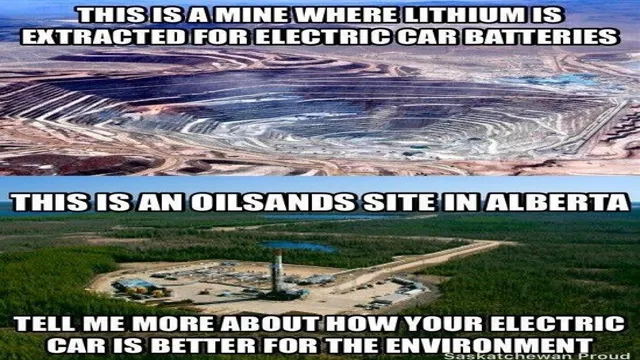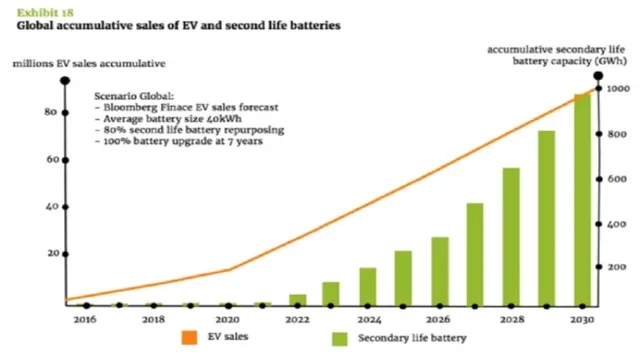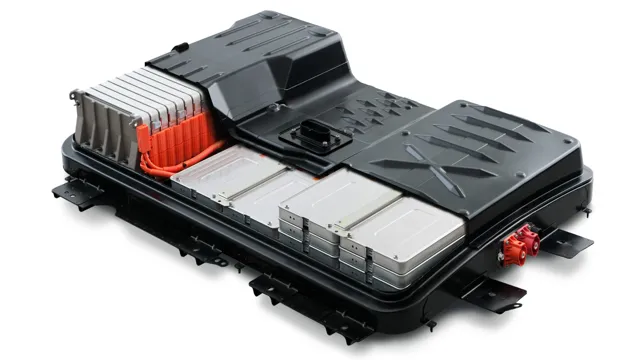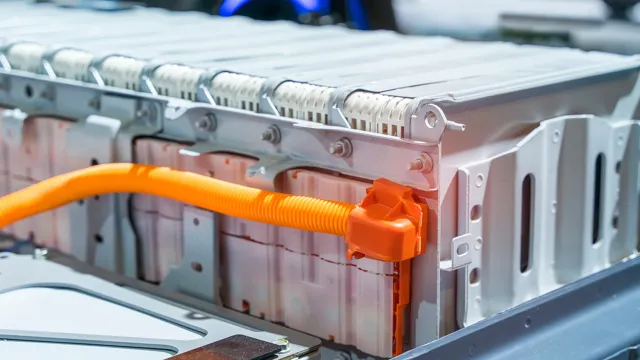Shocking Truth: Exploring the Environmental Impact of Electric Car Batteries
Electric cars have been gaining popularity in recent years, and for good reason. They are environmentally-friendly, produce zero emissions, and reduce our dependence on fossil fuels. However, the batteries that power these cars are often a topic of concern.
How do they impact the environment? Are they truly sustainable? In this blog, we will take a closer look at electric car batteries and their impact on the environment. We will explore the manufacturing process, disposal methods, and how they compare to traditional gasoline-powered cars. Join us as we dive into the world of electric car batteries and uncover the truth about their environmental impact.
What’s inside electric car batteries?
When it comes to electric cars, the question of whether their batteries are bad for the environment often comes up. The batteries used in electric cars are typically made up of various metals, including lithium, cobalt, and nickel. While these materials are not inherently harmful, their mining and manufacturing processes can have negative environmental impacts.
Additionally, when the batteries reach the end of their lifespan, they can be difficult to recycle, leading to further environmental concerns. However, it’s worth noting that electric cars still have a smaller overall environmental footprint compared to traditional gasoline vehicles, largely due to their lack of emissions. It’s important that we continue to explore ways to reduce the environmental impact of electric car batteries, but we should also recognize the positive impact that electric cars can have overall.
Materials used & their impact on environment
Electric car batteries contain various materials, each with a varying impact on the environment. The most common components of an electric car battery are the cathodes, anodes, electrolyte, and separators. The cathode materials include nickel, manganese, and cobalt.
These materials have a high environmental cost due to their extraction process often involving mining activities that release greenhouse gases and cause habitat destruction. The anode consists of graphite, which is extracted by releasing numerous toxic gases into the environment during its production process. The electrolyte in the battery is usually made of a Lithium salt which has a low environmental impact as compared to other battery technologies.
Separators are a crucial part of the battery which needs to be thin, durable, and able to allow for the movement of lithium ions. Some of the separators use petroleum-based materials like Polypropylene, which have a high environmental impact. A shift towards environmentally sustainable materials could help reduce the environmental burden of electric car batteries.
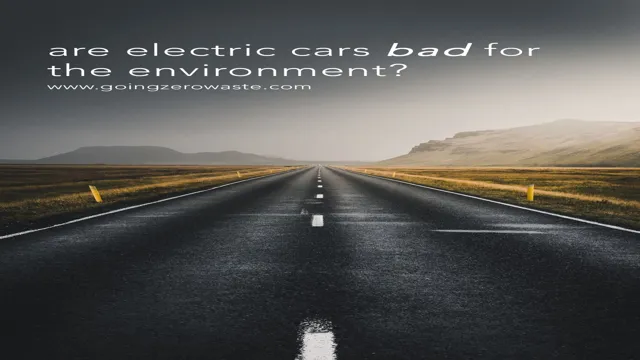
Are electric car batteries recyclable?
electric car batteries Electric car batteries are made up of a variety of components, including lithium, cobalt, nickel, and manganese. These materials are used to create a rechargeable battery that can power an electric vehicle for many miles. Recycling these batteries is an important consideration for both economic and environmental reasons.
The recycling process involves breaking down the battery into its individual components, which can then be sorted, cleaned, and processed into new batteries. While the process of recycling electric car batteries is still relatively new, it is becoming increasingly common, with many companies investing in the technology needed to recycle these valuable resources. As electric vehicles become more popular, it is important to ensure that the batteries used to power them are recycled properly to minimize waste and maximize the sustainability of the transportation industry.
Environmental impact of improper disposal
As electric cars become more popular, concerns have arisen about the environmental impact of their batteries. While electric car batteries are much better for the environment than traditional gasoline or diesel engines, improper disposal can still cause harm. When not disposed of properly, the batteries can release toxic chemicals into the earth and water, leading to pollution and harm to wildlife.
Additionally, the production of electric car batteries requires significant resources, including rare metals that are often mined in environmentally destructive ways. However, as long as the batteries are disposed of properly and efforts are made to reduce the environmental impact of their production, electric cars can still be a much more sustainable and environmentally friendly choice. So, to answer the question, are batteries from electric cars bad for the environment? Only if they are disposed of improperly or their production is not carefully managed.
Leaching & contamination
Improper disposal practices can have serious environmental consequences, especially when it comes to leaching and contamination. When waste materials are not disposed of properly, they can release harmful chemicals and toxins into the environment. These pollutants can seep into nearby water sources, such as rivers and streams, and contaminate the water supply.
This can have devastating effects on the ecosystem and can threaten the health of both wildlife and humans. One of the biggest culprits of leaching and contamination is electronic waste, or e-waste. When electronic devices are thrown away, they often end up in landfills where they can release harmful chemicals like lead, mercury, and cadmium.
Over time, these chemicals can leach into the soil and contaminate the surrounding area. To mitigate the environmental impact of improper disposal, it’s important to properly dispose of waste materials. This can mean recycling e-waste, using composting methods for organic waste, and disposing of hazardous waste at specialized facilities.
By taking a proactive approach and being mindful of our waste disposal practices, we can help protect the environment and ensure a healthier future for all.
Air pollution from combustion during disposal
Improper disposal of waste can have severe consequences on the environment, especially when it comes to combustion. When waste is burned, it releases harmful pollutants such as carbon dioxide, sulfur dioxide, and nitrogen oxides into the air. These toxic substances contribute to air pollution, which can have harmful effects on both humans and wildlife.
Additionally, the burning of waste can release uncontrolled amounts of carbon monoxide, which is a poisonous gas that can lead to serious health problems. That’s why it’s crucial to dispose of waste properly by using methods like recycling and composting, which can help reduce the amount of waste that ends up in landfills. By reducing the amount of waste that’s burned, we can help minimize our carbon footprint and protect our planet for generations to come.
Let’s work together to make a difference!
Greenhouse gas emissions from manufacturing
Manufacturing is a major contributor to greenhouse gas emissions, leading to serious environmental consequences. The disposal of manufacturing waste and by-products is a crucial factor in determining the overall environmental impact of these activities. When these materials are not disposed of properly, they can release hazardous gases and toxics into the environment, leading to air and water pollution, soil degradation, and other forms of environmental degradation.
The consequences of improper disposal can be devastating for both eco-systems and human health. Toxic chemicals can be released into the air and water, contaminating drinking water sources and disrupting the natural balance of the environment. The impacts of these chemicals can be widespread, with long-term effects that can take years or even decades to manifest.
Fortunately, there are ways that manufacturing companies can reduce their negative environmental impact. One key approach is to improve their waste management practices, ensuring that all waste products are disposed of safely and responsibly. This can involve investing in effective treatment and disposal mechanisms, such as recycling and composting.
In conclusion, it is essential that manufacturing companies take steps to reduce their impact on the environment through responsible waste management practices. By doing so, they can help to minimize greenhouse gas emissions, protect natural resources, and promote the long-term sustainability of our planet.
Benefits of electric car batteries for environment
The answer to whether batteries from electric cars are bad for the environment is not a simple yes or no. Electric car batteries are made up of various materials that can have varying impacts on the environment. However, overall, the benefits of electric car batteries for the environment outweigh any potential negative impacts.
Firstly, electric vehicles emit significantly less greenhouse gas emissions compared to their petrol-powered counterparts. With the continued use of renewable energy sources, such as solar and wind power, this reduction in emissions will only improve. Secondly, electric car batteries have the potential to be recycled or repurposed, reducing the amount of waste that ends up in landfills.
Finally, the production of electric car batteries is improving, with manufacturers finding ways to reduce their carbon footprint and use more sustainable materials. With all of these benefits, it’s clear that electric car batteries have a positive impact on the environment.
Lower carbon emissions compared to traditional cars
Electric cars have become increasingly popular in recent years due to their lower carbon emissions compared to traditional gasoline-powered vehicles. This is because electric cars do not emit any harmful gases that contribute to air pollution. In addition, electric car batteries are highly efficient at storing energy, meaning that less energy is needed to power an electric car.
As a result, electric cars have a much lower carbon footprint compared to traditional cars. This is great news for the environment as it helps to reduce greenhouse gas emissions and prevent climate change. By choosing to drive an electric car, you can have a positive impact on the environment and help to create a cleaner, greener world for future generations.
Reduced air pollution from combustion engines
Electric car batteries have immense benefits for the environment, especially when it comes to reducing air pollution from combustion engines. These batteries can help make our air cleaner and safer to breathe by reducing harmful emissions from vehicles. Combustion engines contribute significantly to air pollution by releasing carbon monoxide, nitrogen oxides, and particulate matter into the atmosphere, which can cause respiratory problems and other health issues.
Electric car batteries, on the other hand, don’t produce any of these harmful emissions. By switching to electric cars, we can reduce air pollution and make our cities more livable and healthier. Furthermore, the production of electric car batteries is becoming more sustainable, with manufacturers using more eco-friendly materials and implementing more efficient production methods.
This means that not only are electric cars better for the environment when they’re being used, but their production is also more sustainable. Overall, the benefits of electric car batteries are clear, and by adopting this technology, we can help protect our planet and improve our quality of life.
Conclusion: Overall impact on environment
In conclusion, while it’s true that batteries from electric cars can have a negative impact on the environment, it’s important to remember that their overall effect is far more positive. The reduction in emissions and use of fossil fuels associated with electric cars far outweighs the potential harm caused by battery production and disposal. So sure, while batteries may not be perfect, they’re certainly a step in the right direction towards a cleaner, greener future.
After all, as the famous inventor Thomas Edison once said, “I’d put my money on the sun and solar energy. What a source of power! I hope we don’t have to wait until oil and coal run out before we tackle that.”
FAQs
How do electric car batteries impact the environment?
Although electric car batteries ultimately reduce emissions, the production and disposal of these batteries includes toxic chemicals that can harm the environment.
Can electric car batteries be recycled?
Yes, most electric car batteries can be recycled. Companies like Tesla have established recycling programs to ensure the safe and sustainable disposal of batteries.
How long do electric car batteries last?
The lifespan of electric car batteries varies, but most are designed to last at least 10 years. Additionally, many manufacturers offer warranties for battery replacement or repair.
Are there alternatives to electric car batteries that are more environmentally friendly?
Yes, there are alternative forms of transportation that do not rely on batteries and produce less harmful emissions. These options include hybrid vehicles, hydrogen fuel cell technology, and public transportation.
